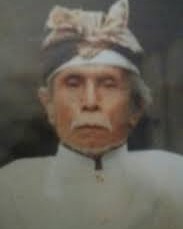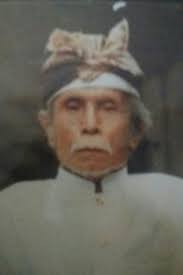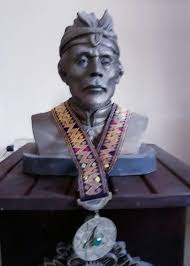
- Name: I Gusti Ketut Kaler
- Location/Ethnicity: Bali, Indonesia
- Archive Type: People
- Life: 1923-1995
- Available File(s): Photo(s)
- Keywords: Tri Hita Karana, Balinese culture, Hindu philosophy, environmental humanities, cultural critic.
- Link: –
I Gusti Ketut Kaler is a twentieth-century cultural critic, religious leader, and author mostly renowned in Bali and Indonesia. One of his major works is Butir-butir Tercecer tentang Adat Bali (Scattered Grains of Balinese Customs) where he conceptualizes the famous principle of tri hita karana. Today, tri hita karana is one of the most cited apparatuses in the conversation on environment, architecture, and social relations among Balinese people (cf. Anggana et. al., 2022). Ketut Kaler wrote this book out of concern for Bali’s cultural and traditional treasures, which he feared would be abandoned by the younger generation. This is, he accuses, a result of the rapid changes of time and modernization in which parents have not had time to introduce it to their children.
While being commonly cited in academics, Ketut Kaler didn’t take formal studies. Yet, he claimed that he “took courses” from pastors, poets, house builders/architects, Hindu religious servants, and all kinds of people. According to many, he is called gelitik, a person who is very concentrated and detailed about various things in Balinese culture. Besides writings, he also used electronic media such as radio (Indonesian Republic Radio) and television (Indonesian Republic Television) during the 1970s to spread religious words and provide counseling, especially Hinduism counseling.
Amid the crises of the capitalist mode of production, tourism, and modernization as left out by colonial legacy, we researchers need to start thinking about I Gusti Ketut Kaler’s contributions. One of the possible ways is considering his works and ideas as environmental humanities.
Photo(s)



Source(s)
- Puri Kauhan Ubud, “Mengenal Sosok Almarhum I Gusti Ketut Kaler, Konseptor Tri Hita Karana yang Terkenal,” September 2021, https://www.purikauhanubud.org/wp-content/uploads/2021/09/MENGENAL-SOSOK-ALMARHUM-I-GUSTI-KETUT-KALER-ASLI.pdf.
- I Putu Surya Anggana, “Tri Hita Karana as a form of pro-environmental behavior in Bindu Traditional Village,” International Journal of Green Tourism Research and Applications 4, no. 1 (June 2022): 30-37.
Written by Abel K. Aruan (November 10, 2024); Edited by Abel K. Aruan (January 6, 2025).